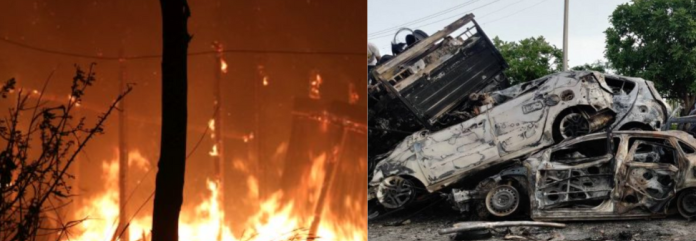DM Monitoring
New Delhi: In 2023, the Bharatiya Janata Party government’s discriminatory and divisive policies led to increased violence against minorities, creating a pervasive environment of fear and a chilling effect on government critics, Human Rights Watch said on January 11 (Thursday) in its World Report 2024.
The Modi government, through persistent discriminatory practices, undermined its global leadership aspirations as a rights-respecting democracy, it added.
“Instead of holding those responsible for abuses to account, the authorities chose to punish the vic-tims, and persecuted anyone who questioned these actions,” said Meenakshi Ganguly, deputy Asia director at Human Rights Watch.
In the 740-page World Report 2024, its 34th edition, Human Rights Watch reviews human rights prac-tices in more than 100 countries.
Indian authorities harassed journalists, activists, and critics through raids, allegations of financial irregu-larities, and use of the Foreign Contribution Regulation Act, which regulates foreign funding of non-governmental organisations.
In February, Indian tax officials raided BBC‘s offices in New Delhi and Mumbai in an apparent reprisal for a two-part documentary that highlighted Prime Minister Narendra Modi’s failure to provide securi-ty for Muslims. The government blocked the BBC documentary in India in January, using emergency powers under the country’s Information Technology Rules.
The report listed several events, highlighting discriminatory practices against religious and other minor-ities.
“On July 31, communal violence broke out in Nuh district in Haryana state during a Hindu procession and swiftly spread to several adjoining districts. Following the violence, as part of a growing pattern, the authorities retaliated against Muslim residents by illegally demolishing hundreds of Muslim proper-ties and detaining scores of Muslim boys and men. The demolitions led the Punjab and Haryana high court to ask the BJP-led state government whether it was conducting “ethnic cleansing,” the report said.
“Over 200 people were killed, tens of thousands displaced, hundreds of homes and churches de-stroyed, and the internet shut down for months, after violence erupted in May in Manipur state, in northeastern India, between the majority Meitei and the minority Kuki Zo communities. BJP’s state chief minister, N. Biren Singh, fuelled divisiveness by stigmatising the Kuki, alleging their involvement in drug trafficking, and providing sanctuary to refugees from Myanmar,” it said.
“In August, the Supreme Court said the state police had ‘lost control over the situation’, and ordered special teams to investigate the violence, including sexual violence.
In September, over a dozen Unit-ed Nations experts raised concerns over the ongoing violence and abuses in Manipur, saying the gov-ernment’s response had been slow and inadequate,” it added.
The report further pointed out that Indian authorities persistently limited freedom of expression, peaceful assembly, and other rights in Jammu and Kashmir. Incidents of extrajudicial killings by security forces persisted throughout the year.
“On July 31, communal violence broke out in Nuh district in Haryana state during a Hindu procession and swiftly spread to several adjoining districts. Following the violence, as part of a growing pattern, the authorities retaliated against Muslim residents by illegally demolishing hundreds of Muslim proper-ties and detaining scores of Muslim boys and men. The demolitions led the Punjab and Haryana high court to ask the BJP-led state government whether it was conducting “ethnic cleansing,” the report said.
“Over 200 people were killed, tens of thousands displaced, hundreds of homes and churches de-stroyed, and the internet shut down for months, after violence erupted in May in Manipur state, in northeastern India, between the majority Meitei and the minority Kuki Zo communities. BJP’s state chief minister, N. Biren Singh, fuelled divisiveness by stigmatising the Kuki, alleging their involvement in drug trafficking, and providing sanctuary to refugees from Myanmar,” it said.
“In August, the Supreme Court said the state police had ‘lost control over the situation’, and ordered special teams to investigate the violence, including sexual violence. In September, over a dozen Unit-ed Nations experts raised concerns over the ongoing violence and abuses in Manipur, saying the gov-ernment’s response had been slow and inadequate,” it added.
The report further pointed out that Indian authorities persistently limited freedom of expression, peaceful assembly, and other rights in Jammu and Kashmir. Incidents of extrajudicial killings by security forces persisted throughout the year.
It also highlighted the case of BJP MP Brij Bhushan Singh, who has been accused of sexual abuse by at least six women wrestlers, spanning a decade, during his tenure as president of the Wrestling Federa-tion of India.
While fighting for justice, women wrestlers, including Olympic medalists, were forcibly detained by security forces.




